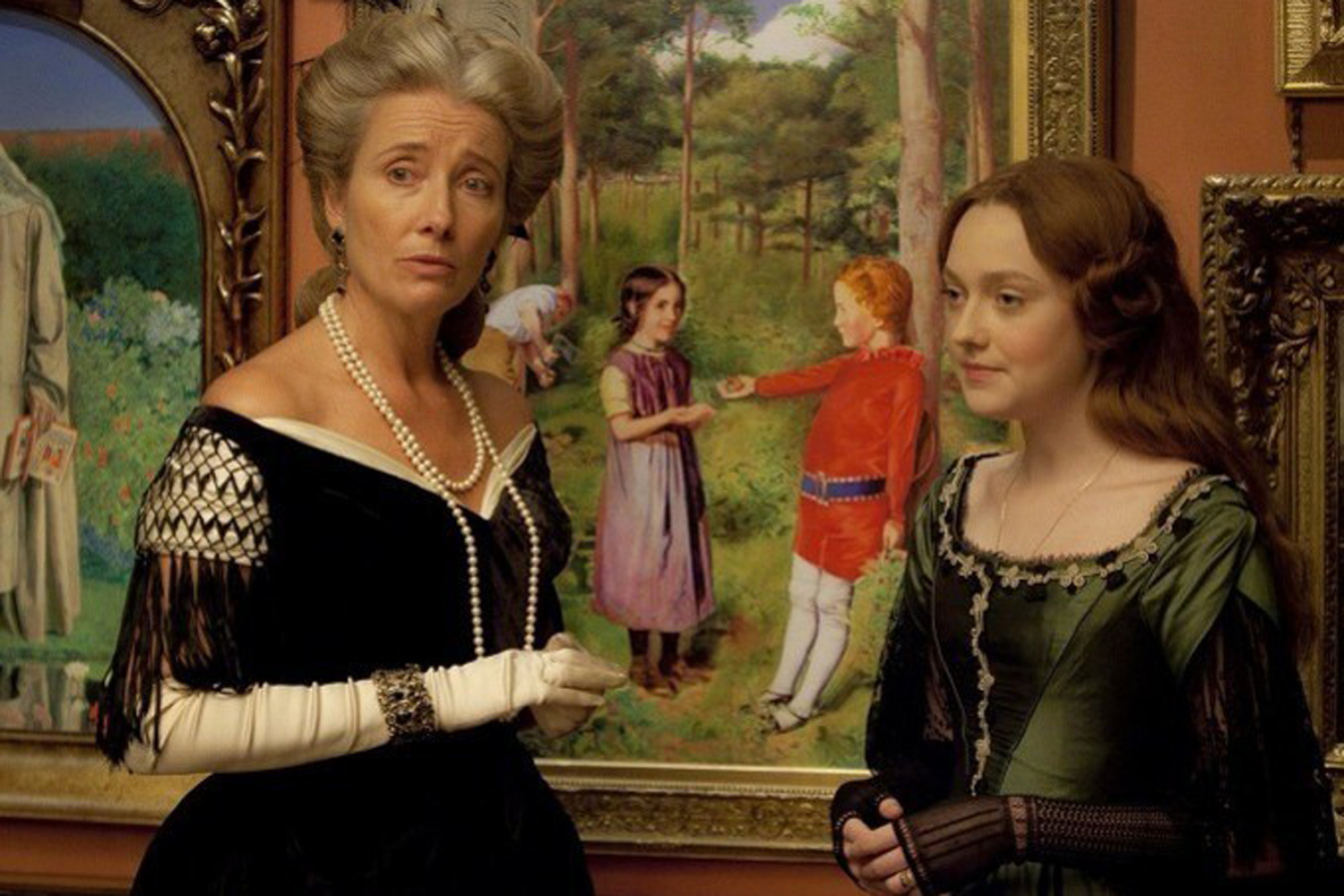By Chlotrudis Independent Film Society
Rating: 4 cats
Director: Richard Laxton

Country: united_kingdom
Year: 2015
Running time: 108
IMDB: http://www.imdb.com/title/tt1605798
Jason says: “There is much more to the life of Euphemia ‘Effie’ Gray than the film bearing her name presents; it limits itself to what are likely the three worst years of her life and maintains so tight a focus that the motivation behind the people making her miserable is rather opaque. It’s easy to be disappointed in the picture for that, as it makes watching it a tremendously frustrating experience, but from another perspective this serves as a strength: This is likely how the situation was, and too often still is, with nothing vaguely resembling explanation for the cruelty involved.
“We meet Effie (Dakota Fanning) at nineteen, recounting her life to her sister Sophie (Polly Dartford) as if it was a fairy tale on the eve of her wedding, albeit one where she met her husband-to-be – famed art critic John Ruskin (Greg Wise) – when she was a girl of twelve and he was rather older. Ruskin seems completely disinterested on her wedding night, and never attempts any sort of intimacy, often being casually cruel. The situation – and, likely, the tonics dispensed by Ruskin’s mother (Julie Walters) – take a toll on Effie’s health, which doesn’t show much signs of improving until the couple take a vacation in her native Scotland, with up-and-coming painter Everett Millais (Tom Sturridge) along, commissioned to paint Ruskin’s portrait.
“Where does this treatment come from? Screenwriter Emma Thompson clearly has some ideas, and occasionally gives the viewer hints, but she and director Richard Laxton leave our anything that might be explanatory enough to let Ruskin off the hook. It is just who he is, and Greg Wise plays the man with a sort of flatness; he’s so self-centered that he barely gives Effie a thought. He presents intelligence but not empathy, and though he becomes colder as the movie goes on, it’s seldom so overtly monstrous that he loses the sense of being a puzzle.
“That’s a contrast to Dakota Fanning as Effie, whose story is all too clear from the start – she’s very intelligent but relatively uneducated on just about every topic, and spends much of her time intimidated, whether by her husband or his parents. It’s very impressive that she gets that duality across, because any tendency toward assertiveness is buried quite deep because of how a woman in the mid-1800s is trained to behave, making her attempts at discussion halting at first and her later attempts to take control of her life feel almost shown, like it is physically difficult for her to do.
“The collision between these two levels of power in that environment is terribly unbalanced by nature, and there is little Laxton and company can do to make it otherwise, which can lead to the film being a bit of a slog no matter how impressive the lead performances are. Fortunately, the film is peppered with gems in smaller roles. The largest and most important of these are probably David Suchet and Julie Walters as Ruskin’s parents, doing their best to hint at what is wrong with the son between the father’s close-held ambition and the mother’s uncomfortable doting. Tom Sturridge and Riccardo Scamarcio are both enjoyable as the men who see Effie as someone worth more attention than John gives her, with the latter bringing Claudia Cardinale as part of the package. And I have little doubt that Emma Thompson had Lady Eastlake in mind for herself from the moment she started writing the script; she’s a perfect match for Thompson’s intelligence and wit, and her interplay with James Fox gives a hint at the best way that these sorts of marriages can turn out.
“Director Richard Laxton is a guy who has mostly toiled in television, and presents the film without a lot of obvious flourish. Still, it’s not hard to think of Mr. Turner a bit in watching the film, not just because he’s mentioned early on; cinematographer Andrew Dunn and production designer James Merifield do evoke the paintings of the era while also using the fog and gloom to get Effie’s mood across. It’s a dreary sort of atmo phere, but effectively so, and not in such an oppressive manner that the film becomes too heavy to watch.
“Well, for some; given that the film ends at the point when many would just be entering the third act, it’s undoubtedly something of a downer. At the very least, it’s austere, even with its array of interesting moments and nice casting, although worth a look if you like this sort of thing. 4 cats”
